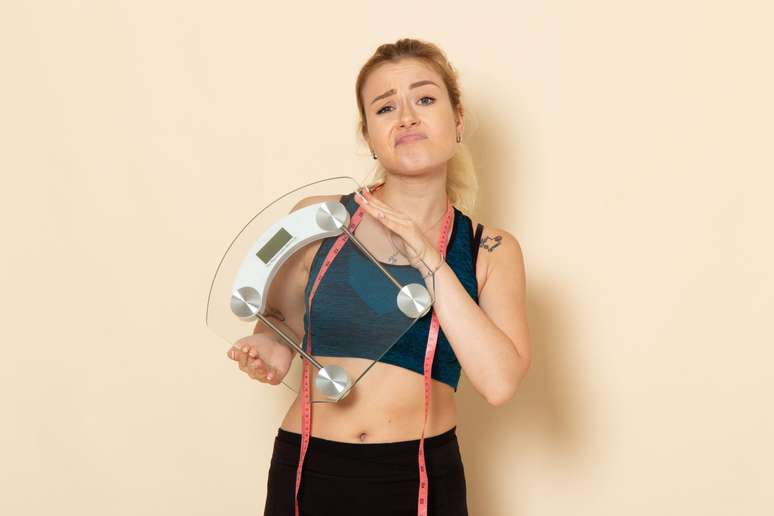Research has shown that nearly 1 in 5 Brazilians feel unhappy, which can lead to problems throughout the body, weakening health
Are you feeling happy? A survey entitled “The happiness of Brazilians” showed that 19% of the population – or almost one in five people – feel unhappy. While the majority (52%) said they were more or less happy, only 29% of respondents said they actually were. The absence of joy, however, can take a toll on the health of the entire body.
html[data-range=”xlarge”] figure image img.img-73947d8c324ae55f05c4ce3015343fcc5t2gbq60 { width: 774px; height: 463px; }HTML[data-range=”large”] figure figure img.img-73947d8c324ae55f05c4ce3015343fcc5t2gbq60 { width: 548px; height: 328px; }HTML[data-range=”small”] figure figure img.img-73947d8c324ae55f05c4ce3015343fcc5t2gbq60, html[data-range=”medium”] figure image img.img-73947d8c324ae55f05c4ce3015343fcc5t2gbq60 { width: 564px; height: 337px; }
The study was designed and coordinated by advocate, mentor, speaker, happiness specialist, Mary Elbe Queiroz, and implemented by the Qualibest Institute. The survey identified a worrying situation regarding the number of Brazilians declaring themselves unhappy.
People who declare themselves happy identify happiness as linked to family, personal (inner) characteristics and the way they face life. Just like self-care, optimism, resilience, gratitude and forgiveness appear as relevant aspects to generate a fuller and more genuine sense of happiness. While those who define themselves as unhappy understand that happiness is linked to the body and financial situation.
I study
The research took place online, in two phases: the first, qualitative, interviewed 32 people, of different ages, genders, orientations, races and social classes, on 9 January 2022. The objective of this phase was to build a sense and identify the characteristics related to happiness, based on questions on the topic.
The second phase, quantitative, interviewed, between 6 and 18 April 2022, 1105 people, from all regions of Brazil, men and women, aged over 18, of the ABCDE social classes.
Taking into account that Brazil has a universe of 152 million Internet users, which corresponds to 81% of the Brazilian population, it can be said, according to the study, that just over 30 million people are unhappy in Brazil.
After all, what is happiness?
When asked how happy people are, respondents associated them with different characteristics more or less homogeneously. However, ‘they feel good about themselves’, ‘they approach life simply and lightly’, ‘optimists’ and ‘have high self-esteem’ were the items that received the top marks.
When comparing happy and unhappy people, most self-described happy people have these characteristics. While in the universe of people who define themselves as unhappy, these qualities were not so recognized.
For example, 88% of happy people said that the main aspect of happy people is feeling good about themselves and only 61% of unhappy people said so. Already 90% of happy people believe that to achieve happiness it is necessary to value oneself, while only 67% of unhappy people made this statement.
As for the definition of happiness, the majority said that “family” is the first word that comes to mind when thinking about the meaning of happiness. Also among the top mentions are feelings such as peace and love, as well as objects that ensure well-being.
Happiness boils down to what?
Participants associated the perception of happiness more with positive attitudes than with financial problems and luck. For example, 93% of happy people emphasized the element “being thankful for the good things that happen in my life.”
Overall, only 14% of respondents associate happiness with “luck”, 20% with “destiny” and 22% with “having material possessions”. However, considering the two groups, with respect to what is considered to be the main contributor to unhappiness, 57% attribute it to their economic situation and 40% to the death or illness of loved ones.
In the comparison between happy and unhappy people, in the spontaneous research, the family has proved to be an element that significantly interferes with the happiness of both groups. In the stimulated poll, the majority of people who self-reported unhappiness (64%) said that freedom is one of the strengths in the definition of happiness, and the majority of people self-declared happy stressed aspects such as gratitude , family and the demonstration of affection.
Which road to happiness?
Regarding what needs to be done to achieve happiness, respondents believe that happiness depends on one’s behavior and attitudes. In this sense, the answers “I respect myself” were the most appreciated by those who declared themselves happy (90%), while for those who said they were unhappy it was 67%. “Take care of my health” was said by 85% of happy people and 68% of those who describe themselves as unhappy.
The point of view of happy and unhappy people in relation to this topic is similar according to the survey. Both groups mentioned the same features to work on. Although the happy ones indeed have these traits and the unhappy ones know which ones are needed but don’t have them, the latter placed more emphasis on external factors than the happy ones.
The situation was reversed in the entry “I believe that money brings happiness.” While 67% of the unhappy feel that their financial situation contributes to their unhappiness, this percentage drops to 31% of the happy.
Study conclusions
The study concludes that most people, even those who claim to be happy, still base their happiness on external factors, such as family, religion, body image, material possessions, romantic relationships. Perhaps for this reason the result of the survey is a large number of people who declare themselves unhappy (19%) and more or less happy (52%), because it is scientifically proven that happiness is built on the basis of inner aspects.
This conclusion reinforces Mary Elbe’s thesis who, on the basis of her studies in neuroscience and positive psychology, but also through personal experiences and research, discovers that happiness is a state of mind and a way of seeing life, and can be built by development of internal factors, which the individual must persist, develop and incorporate into his daily life.
“For this they can be supported by behavioral strategies that lead to self-knowledge and can be trained to develop more positive attitudes that become habits that make people happier”, says the research entrepreneur, for whom “it is not people successful people who are happy, but happy people who are successful, thrive and get everything they want.”
What is the relationship between health and happiness?
When we experience pleasure and happiness, emotional aspects are involved that directly affect our physical and mental health, explains psychoanalyst Dr. Andrea Ladislau. “Our health can also be influenced by the power of positive thinking, as our immune system will be strengthened, reducing the risk of disease and also allowing for longer life,” he clarifies.
According to Andrea, positive thinking has a big impact on our whole body and on our health. “It helps with mental and emotional illnesses, such as depression, loneliness and stress, relieving symptoms and rehabilitating the body. There is evidence that even diabetes can have its critical factor reduced by positive mentalizations. Scientifically, positive thinking will help in treatment and, in some cases, even their cure”, he points out.
However, the opposite also happens. “The pessimistic spirit, in addition to attracting greater physical, emotional and mental discomfort, undermines the immune system and can aggravate various diseases and symptoms”, warns the psychoanalyst.
happiness hormones
It is worth noting that happiness is directly associated with the production and release of the well-known good hormones. They are the ones that will manifest the feeling of well-being in humans, as well as promote health balance, explains the professional. Andrea describes in detail the action of each of these hormones:
- serotonin: it acts in the body by helping to regulate sleep, mood, appetite, heart rate and emotions, i.e. it is a regulator of excesses;
- Endorphin: acts as a natural pain reliever in the body and its release controls our body’s response to stress, pain and also negative emotions;
- Dopamine: it promotes the feeling of pleasure, improves mood, i.e. it also regulates our emotions. It also causes positivity and joy to take over our days, making it easier to look at challenges;
- Oxytocin: produced by the body when it feels relaxed and secure, also called the “love hormone”.
With this combo we will have a reduction in states of anxiety, pessimism and depression, underlines Andrea.
Source: Terra
Ben Stock is a lifestyle journalist and author at Gossipify. He writes about topics such as health, wellness, travel, food and home decor. He provides practical advice and inspiration to improve well-being, keeps readers up to date with latest lifestyle news and trends, known for his engaging writing style, in-depth analysis and unique perspectives.






-t84500vauzw7.png)


